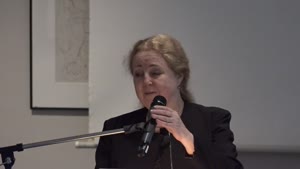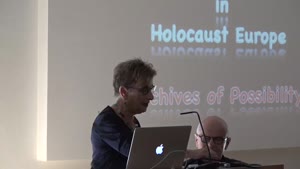Grasping for the Past: Postcatastrophic Biographies - Irena Grudzińska-Gross - Universität Hamburg
- Lecture2Go
- Videokatalog
- F.5 - Geisteswissenschaften
- Sprache, Literatur, Medien (SLM I + II)
- The Afterlife of the Shoah
Videokatalog
3663 Aufrufe
30.05.2017
Grasping for the Past: Postcatastrophic Biographies
Contemporary cultural studies dealing with the Shoah are strongly influenced by the concept of postmemory. The focus is on the communication and visualization of the traumatic events of the so-called second and third generation, who have taken this as part of a family transfer perspective. The generational and temporal distance to the Shoah is also included in another concept, the concept of the postcatastrophy. Similar to the concept of postmemory, postcatastrophy does not lay its focus on the actual events in World War II, but takes a look at the effects of the catastrophe of the Shoah. This semantic shift means that we are no longer asking what happened, but rather how we receive knowledge about the facts. Both concepts do not conceive of the extreme experience as a state, but as a process which extends into the postcatastrophic situation. In contrast to the concept of postmemory which stresses individual transmission within the family, postcatastrophy is more focused on collective constellations. Especially since the spectrum of the afterlife of the Shoah also includes things, objects, remains, and ruins whose transmission is not primarily defined in terms of (biological) inheritance. Another feature of the postcatastrophic concept is its comparative perspective in the sense of a multidirectional memory. This includes the memory of other victims of Nazi crimes (including Romanies, political prisoners, forced laborers, prisoners of war), the anti-Semitism of the pre- and post-war period, the Holodomor in Ukraine (1932-1933), of Stalinism, the expulsion of Germans from Czechoslovakia, and from the former German eastern territories, etc. Thus, the concept of postcatastrophy serves to integrate the Shoah not only in the context of national socialist crimes, but to consider it in a semantic proximity to other crises of the 20th century, in order to work out their peculiarities or differences.
Technischer Support
Bitte klicken Sie auf den nachfolgenden Link und füllen Sie daraufhin die notwendigen Felder aus, um unser Support-Team zu kontaktieren!
Link zu der RRZ-Support-Seite


